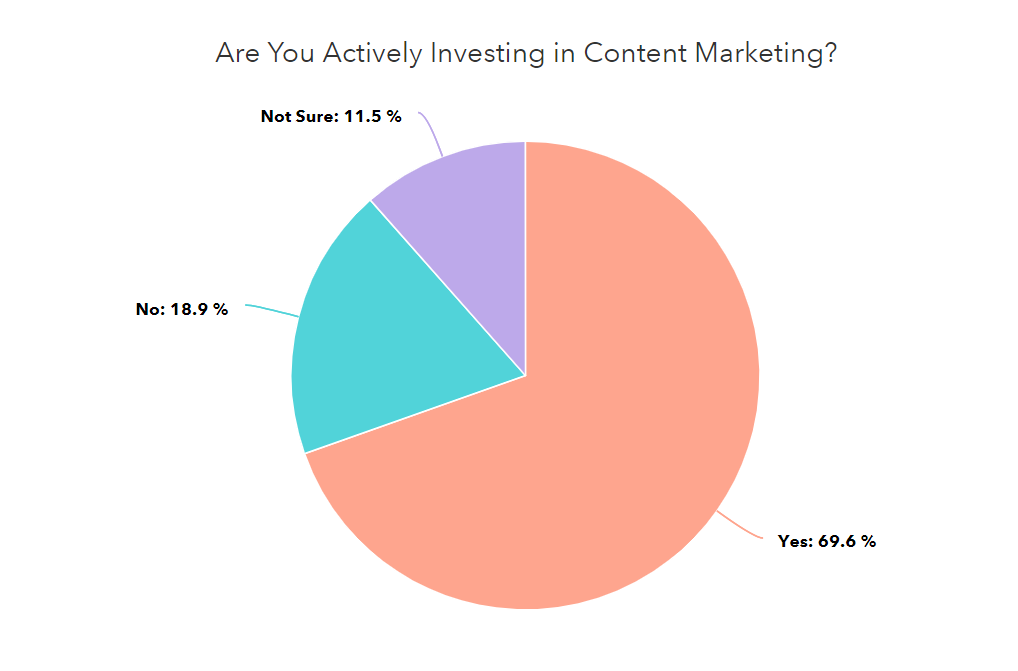Everyone’s talking about Content Marketing today.
In fact, you’ve most likely heard this phrase, “Content is King” when anyone talks about Content Marketing.
But what is Content Marketing exactly?
As one of the most effective methods available today for growing audience engagement, developing a brand presence and driving sales, content marketing has been proven to deliver resounding success for businesses.
Joe Pulizzi, the founder of Content Marketing Institute has this to say, “Content marketing is a strategic marketing approach focused on creating and distributing valuable, relevant, and consistent content to attract and retain a clearly-defined audience — and, ultimately, to drive profitable customer action.”
In easy terms, content marketing is made up of all sorts of content, such as blogs, eBooks, articles, newsletters and videos, even e-mails, all carefully created to deliver information across all stages of the marketing funnel.
It’s a long play that’s designed to educate the audience for future conversions.
Why Do Businesses and Marketers Think Content Marketing is Important?
According to Hubspot’s Not Another State of Marketing report, content creation is an active investment for 70% of marketers.
These numbers are not hearsay, in fact nearly 40% of marketers agree that content marketing is a very important part of their overall marketing strategy (Hubspot).
Prior to the COVID-19 pandemic, 73% of B2B businesses allocated a budget for content creation in 2020, compared with 71% of B2C businesses.
Despite the effects of the pandemic during the 1st half of 2020, 53% of B2B businesses did not see any change in their content creation budget, while 18% reported an increase (Content Marketing Institute).
30% of businesses expected that budget to increase for the 2nd half of 2020.
Similarly in B2C businesses, 51% stated no changes in the 1st half of 2020, while 17% saw an increase.
The expectation for the 2nd half of 2020 was more similarly optimistic with 27% of businesses choosing to increase budgets for content creation (Content Marketing Institute).
However, don’t just look at the numbers. Be convinced to craft a content marketing strategy, once you know the following:
What Benefits Do Content Marketing Provide?
1. Establish Brand Trust
Content really is king.
Great content is such an invaluable asset that it can create a multitude of opportunities to help build a relationship with your audience no matter if they’re potential customers (leads) or existing customers.
When you post content and it gets read by consumers, you’re helping them form an opinion of your brand.
Consumers want to find content that is engaging, educational, and valuable. These factors will influence them in their continued opinion about your business.
The more a piece of content helps to add value to what a consumer is looking for, the more it builds trust.
Pushing your content through third-party publications or sharing it with influencers to broaden your touchpoints will also help you further build trust with your audience.
2. Increase Conversions
Simply publishing content is not enough.
The content itself has to be meaningful, enough so that consumers reading it will be encouraged to pursue a deeper relationship with your brand.
High-quality consistent content allows your audience to connect with you and helps them make an informed purchasing decision.
Don’t forget adding the all-important Call-to-Action, which guides the consumer on what’s needed next in the conversion process.
3. Build Authority
Consistently publishing relevant, meaningful content which demonstrates the depth and breadth of your experience and relevance to the industry, will build authority.
Listening to questions, answering and interacting with your leads and customers while drawing on your expertise, reflects positively on your business and raises further credibility for your opinions and recommendations, even more so if you don’t demand anything in return.
Building up your authority in this way, helps your website rank higher in search engines and eventually promotes you as an industry leader.
4. Enhance SEO
SEO is another oft-heard term these days. It’s no longer possible to ignore if you want to improve the visibility of your business online.
In fact, content creation counts as one of the most effective SEO techniques based on Tech Client.
Business sites that post consistently on their blogs average a whopping 434% more pages indexed by search engines than those that don’t publish at all.
The more content there is available on your site, the more pages that a search engine can index and show to users in their search results.
More pages don’t necessarily mean more traffic, but it does increase your opportunities for ranking across more keywords especially if your content is clustered around a main topic and similar relevant ones (Hubspot).
Having all that content available also means that visitors can continue to browse your site for more content that catches their attention.
This provides a positive impact on your search engine optimisation when visitors spend more time sticking around your website, which in the eyes of search engines like Google, means your site provides valuable content.
5. Generate Leads
Content marketing can also generate leads.
When consumers view your content, especially meaningful content that’s provided for free, they’re forming an opinion about purchasing from you in future.
If they follow calls-to-action (CTA) that were included inside your content, new leads may be generated.
This is particular important for small businesses where consistent traffic is crucial in growing their brand and boosting sales.
Content marketing is affordable, it costs 62% less than traditional marketing but generates about 3 times as many leads, according to DemandMetric.
Small businesses that want to control their budget should consider the affordability of content marketing but also note that it’s time-intensive and suited for a long-term view since results are not instant.
6. Content Doubles as Sales Material
Help your sales team by understanding your buyers and knowing what they respond well to in terms of content.
There are many types of product marketing content that would assist sales teams such as (Hubspot):
- Product pages
- Product videos
- Blog content
- Case studies
- ROI reports
- Product demos
- Surveys
- Sales presentations
- Overview sheets
Content can function as a sales tool for both B2B and B2C businesses.
Work with your sales team on the kind of content that they need before building a strategy from the bottoms-up of the funnel.
7. Driving Web Design
In the midst of planning a revamp of your website?
Consider planning for a good user experience that’s driven by both design and content.
You don’t want someone to land on your website, appreciate its beautiful design and then run away upon viewing the poor content.
Content on your website is an important feature and should be treated thusly.
8. Complements Paid Ads
Any paid media such as display ads, PPC, and social ads can benefit from content.
However, not every ad should drive a conversion-centric strategy.
In fact, paid media needs to exist at all levels of the marketing funnel.
For instance, if the consumer has never heard about your brand before, it’s unlikely that there will be an instant sale through ads.
Start off with informative pieces such as blog posts, articles, infographics and videos that introduce your brand to consumers and don’t necessarily involve a sale.
Later, those ads can be updated for more targeted audiences in order to drive conversions.
These are just some of the benefits that content marketing can provide you.
Content marketing is so much more than just producing a few blogs or making an infographic.
Content marketing today forms the backbone of marketing strategy.
How can you do it?
Take an audit of your current content, see what works for your business and industry and brainstorm with your marketing team on creating a content marketing strategy that suits you.
And if you need more help, contact us anytime for a consultation.


